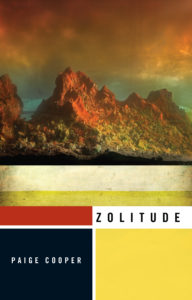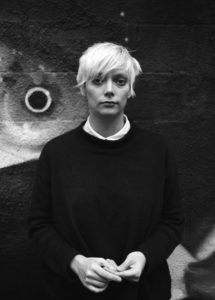Paige Cooper’s stories have appeared in a number of excellent journals and have been anthologized in The Journey Prize Stories and Best Canadian Stories. Her debut collection Zolitude was published by Biblioasis this past February. Hailing from Canmore, based in Montreal, and traveling widely in person and on the page, Paige creates fictional worlds that resist easy categorization or resolution. Brad de Roo spoke with her about narrative corruption, artistic tourism, short story form, and ‘the splashy chaos of reality.’
What draws you to the short story form?
Concision. Novels require lulls and reflection, and I’m not happy writing that necessary boredom, I prefer reading it. I’m a lazy addict. I’d rather hit the high in twenty pages. There’s also the control required in short fiction; every mouthful in the bottle has to be as good as the rest. I wish I was a poet, that I could disrupt time and consciousness in twenty lines, but I’m enough of a despot that I like it when landscapes and micro-climates are enslaved to time’s arrow, i.e., narrative. Even if narrative is corrupt—which, maybe.
How might narrative be corrupt?
Narrative titrates out meaning so precisely and narrowly. It’s a form of control. The language poets have called it totalitarian. Obviously consenting to this can be pleasant, but it can also be too easy, it can soothe us like passengers, make us forget we’re complicit. I don’t like reading narrative prose out loud to an audience: asking them to stand in my own syllogistic bread-line for seven to ten minutes seems like an abuse of the capacities of a receptive imagination. But since—despite all these misgivings—I still write narrative prose, it seems the best I can do is make sure that the language doesn’t erase itself. There must be a jolt.
Is it ever corrupting?
I hope so. I like how Madeleine Maillet puts it: “Narrative will do things to you that you did not foresee or consent to. That is why rich white men prefer non fiction.”
Do stories have definitive characteristics that persist no matter the particular world you are creating? Or does the fictional world in question warp formal limits?
The story often follows the place, yes. Whether I think I know that much about a place or not, I probably start with the facet that’s caught me—geology, genealogy, office architecture, wildlife, I don’t know, whatever degree of isolation we’re dealing with—and exploit it. Then the rest is mostly gaps. Even when I was writing my hometown I couldn’t roast it effectively enough, air all my grievances about “amenity migration” or whatever, because my fiction isn’t long or experimental enough to contain polyphonic multitudes. To frame a thing is to exclude parts of it, its context, other things. When I’m a tourist (I am always a tourist) I can’t pretend to get it right. There’s no knowing anything, especially not when we’re stuck here in language, so the imagination fills the gaps between the word and the world. The places that attract me are the ones where that ignorance or exclusion is dangerous, where not knowing the ice is rotten or the police are corrupt or that man is a monster could actually harm you.
I find your idea of being a constant tourist compelling. Do you think that being a writer – or any artist for that matter – requires looking at the world (even home) like a tourist?
Most artists spend a lot of time observing, or at least it’s a popular idea that we do. The difference between being a tourist and an observer is that as a tourist I want something for myself. There’s a greediness and an inequality implicit in the relationship. No one besides a marketing department ever invited a tourist in. We just show up in someone’s home because capitalism told us we deserve to be there. I’m being harsh—of course there are exceptions—but I grew up in a place that was eaten alive by tourism, and when I return there I am now also a tourist, and the thought of doing that to someone else’s home is sickening. I have a hard time travelling. And in jobs, acquaintanceships, waiting rooms, relationships, I can’t avoid it: I’ve been writing long enough now that I know when I’m nosing around for something to take, something that isn’t mine. It’s exploitative. It’s not always subtle. I feel guilty when a story is published and people can see what I’ve used. I suspect most artists feel at least a little guilty—even if they’re not misappropriating people or stories there are texts that have been leaned on, and other influences that don’t need to be cited under any moral imperative. But fiction doesn’t come from nowhere. It doesn’t just spring fully-formed in a suit of armour from Zeus’ forehead. Unfortunately.
The stories in your collection do not show allegiance to common schools of aesthetic thought (like realism, formalism, minimalism etc.), nor are they afraid to explore different genres (sci-fi, myth, spy fiction etc.). Is any aesthetic world essentially artifice? Do you think all generic forms are able to get at important emotional truths?
I guess by default I’ve always thought of myself as a realist, but simultaneously I’ve always been unable to relax into the banality of emotion. I’m told this is a symptom of adolescence. It’s absurd that our emotions are a) invisible and b) self-reported via such a crappy medium as language. Emotion is fed by the imagination so it’s an obvious extension to use the fantastic as the objective correlative for dread, paranoia, desire, triumph. I wish I could write autofiction because then I’d at least have a working theory as to how my gritty floors relate to my resentment over these text messages I won’t open, but I can pay my therapist to parse that. A horse is alien and sublime, so here is a horse with wings.
Your stories plunk the reader right into the middle of things. In other words, they often eschew direct exposition. Does direct exposition get in the way of the emotional actions of characters?
Narrators are addressing themselves, they don’t think about audience. Maybe the more narcissistic ones are show-offy, but for the most part they’re too self-involved to explain anything so obvious as nuclear fusion or heterochronic parabiosis. They live deep in their own jargon and in-jokes and perception. I agree that hand-holding is necessary, so I go back during edits to elucidate the boundaries of their reality. I try to leave a light on where the borders touch our borders. Of course I want to avoid the false tension of the reader not knowing something the narrator knows, that trick’s too cheap. A real question is required. My poor friends yell at me about how hostile some of the stories are—they’re hostile to me, too, usually.
Amid the collection’s notable formal diversity, certain interests repeat. There is a repeated return to Eastern Europe (or places fictionally like it). There is a consistent interaction with sublime or unforgiving environments (the Rocky Mountains, tropical jungles, a new planet). Sex, both sublime and unforgiving, is also ubiquitous. Do you find yourself deeply analyzing such repetitions – their connections to an aesthetic whole or network? Or are such clusters simply the subconscious palette of your current story-making?
Apparently the best an artist can do is identify their obsession and follow it, using whatever material is available. Writing fiction is the only way I know how to congeal the splashy chaos of reality. Make a living tree out of old furniture, to paraphrase Anne Sexton. There are ideas and questions caught in some of my old stories that I don’t ever remember being concerned with, but there they are, living like Jean Genet in an oubliette. I could analyze it: the sublime comes up because I grew up in the mountains and the pastoral makes me impatient. Sex comes up because I’m insecurely attached or because I’m a double Scorpio. Warping people and places into something as apparently contained as a short story is as embarrassingly inadequate as buying a souvenir at the airport, but that compulsion is valid, I think. It’s too sad, otherwise. Everything being so brief.
Paige Cooper’s stories have appeared or are forthcoming in The Fiddlehead, Gulf Coast Online, Michigan Quarterly Review, CAROUSEL, Minola Review, and The New Quarterly, and have been anthologized in The Journey Prize Stories and Best Canadian Stories. Her first book, Zolitude, has been released from Biblioasis.
Brad de Roo (@BradRdeRoo) lives in Guelph, Ontario, where he works at the Bookshelf bookstore; conducts interviews with a variety of artists; writes short fiction; and collaborates on strange music.

